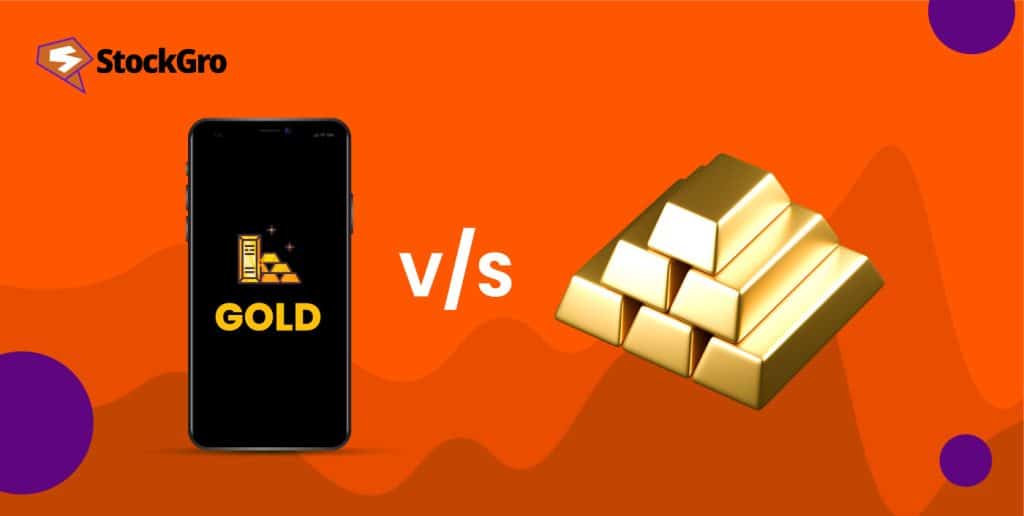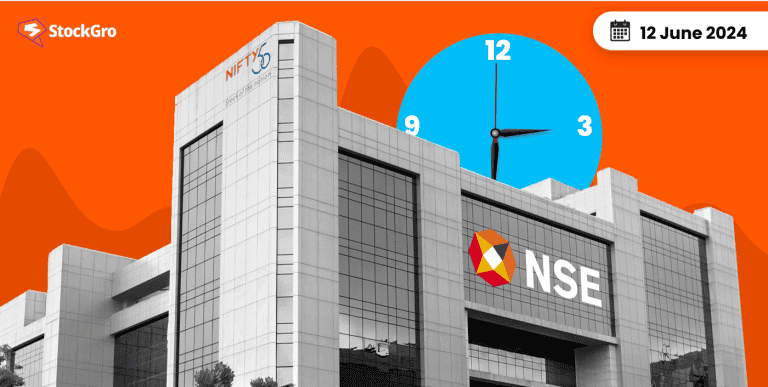
A common strategy for protecting wealth has always been to invest in gold. It has a reputation for being a dependable and stable asset throughout history. Recently, there has been a debate about why people buy digital gold vs physical gold.
Both tangible and digital gold have unique benefits and drawbacks. Both forms of gold serve the same primary purpose but differ in terms of accessibility, convenience, and security.
The gold market in India has been steadily expanding. For instance, the market value rose to ₹75,000 crores in Q1 2024. This increase highlights gold’s enduring appeal as an investment. Jewellery consumption grew slightly, while the demand for bars and coins surged, reflecting their value as investment assets.
Whether you prefer the tangibility of physical gold or the modern convenience of digital gold, it’s important to weigh the pros and cons of each. The following piece will assist you in determining which choice would be more appropriate for your investing requirements.
Understanding gold as an investment
Gold has long been valued for its stability and reliability. It has historically provided refuge during financial crises. A lot of investors use gold as a means of asset protection.
- In India, gold carries cultural significance beyond its financial value. It’s a symbol of wealth and prosperity, especially during festivals and weddings. This cultural importance sustains demand, making gold a valuable and liquid asset.
- The ability of gold to fend off inflation is one of the key arguments in favour of investing in it. Paper money sometimes loses value when inflation increases, but gold usually appreciates in value.
- Gold also offers diversification benefits. Including gold in a portfolio of investments can help reduce the risks brought on by market volatility. Gold acts as a hedge against market volatility since its value is not directly correlated with the performance of financial markets.
- Globally, gold is widely accepted and easily convertible into cash. This universal acceptance ensures that gold remains a highly liquid investment. You can sell gold almost anywhere, providing flexibility and financial mobility.
Also read: Gold vs Equities- Which is the right investment option?
What is digital gold?
A contemporary method of holding gold without the requirement for physical possession is through digital gold. Instead, your ownership is recorded electronically, making investment simpler and more convenient.
There are multiple types of digital gold, and each has special advantages and characteristics.
- Gold ETFs (Exchange-Traded Funds): These are mutual funds that are traded on stock exchanges and invest in gold. Like stocks, they are easy to trade and have liquidity.
- Gold Mutual Funds: These funds make investments in assets linked to gold, including gold ETFs. They offer an alternative to demat accounts for gold investments.
- Sovereign Gold Bonds (SGBs): These bonds, which are backed by the government, are issued by the Reserve Bank of India and have fixed interest rates. They provide a secure investment option with price appreciation and interest earnings.
- Gold Futures Contracts: These are standardised contracts traded on exchanges like MCX. They involve agreeing to buy or sell a specific quantity of gold at a set price in the future, making them suitable for experienced investors looking to hedge or speculate.
Advantages of digital gold:
- High liquidity: You can buy and sell digital gold quickly online, providing instant access to your investment.
- No physical storage: Eliminates the need for physical storage, reducing costs and hassle.
- User-friendly transactions: Platforms are designed to be easy to navigate, making buying, selling, and managing investments straightforward.
Nonetheless, there are a few things to remember:
- Technology reliance: Your access to digital gold depends on the functionality of digital platforms and internet connectivity.
- Provider trust: To guarantee the security of your money, pick a reliable and safe platform. Provider credibility is key in the digital gold investment experience.
Regardless of these drawbacks, digital gold blends the ageless worth of gold with the ease of online transactions. For many investors searching for a cost-effective method of portfolio diversification, this makes it an enticing option.
Also read: SGBs: A smarter way to invest in gold
What is physical gold?
Gold that is in the form of coins, bars, and jewellery is referred to as physical gold. Physical gold provides a sense of palpable security since it can be handled, felt, and stored, unlike digital gold.
Why physical gold?
- Cultural value: In addition to its monetary value, it has cultural significance and is frequently handed down as family heirlooms throughout generations.
- Direct ownership: Removes the counterparty risks connected with financial products by enabling direct control and ownership.
Yet, there are inherent difficulties with physical gold ownership.
- Storage expenses: You may need to pay a substantial amount more for insurance and secure storage.
- Theft risk: Because physical gold is prone to theft or loss, certain security protocols are required.
- Problems with liquidity: Digital gold may be converted into currency more quickly and easily than actual gold. It entails locating a possible buyer and going through verification procedures.
Despite these challenges, physical gold remains a popular investment choice. Physical gold is frequently bought by investors from jewellers, banks, and bullion dealers. They store it securely in vaults or safe deposit boxes, ensuring its protection.
Digital gold vs physical gold– which is better?
The decision between digital gold vs physical gold is influenced by a number of variables, such as investment objectives, time horizon, risk tolerance, and cost. The following is a thorough comparison to help you determine the best choice for you:
| Factor | Digital gold | Physical gold |
| Investment goals | Suitable for those looking for easy trading and short-term gains. Offers convenience and ease of transaction. | Ideal for long-term wealth preservation. Tangible and reliable in economic uncertainties. |
| Time horizon | Great for short-term investments. Quick to buy and sell. | Better for long-term holding. Requires more effort to liquidate. |
| Risk tolerance | May carry counterparty risk, relying on the custodian holding the gold. | Regarded as a secure investment without any counterparty risk. |
| Cost | Lower transaction costs and can be bought in small denominations. | Higher transaction costs and typically bought in larger quantities. |
| Maintenance | No need for physical storage, tracked via a demat account. | Requires secure storage, either at home or in a bank’s safe deposit box. |
| Liquidity and returns | Highly liquid, it can be sold anytime. Returns depend on market price fluctuations. | Liquid but may take time to sell. Returns are based on gold price changes. |
| Taxes | Capital gains tax applicable on sale, no tax on holding. | GST on purchase, capital gains tax on sale. |
You may also like: Goods and service tax on gold – everything you need to know!
Bottomline
Choosing between digital gold vs physical gold depends on your personal investment goals, time horizon, risk tolerance, and cost considerations. Because it’s convenient and simple to trade, digital gold is a good option for short-term investments. Conversely, physical gold carries no counterparty risk and is a dependable choice for preserving wealth over the long term. Take into account your requirements and preferences while deciding which option is best for your financial portfolio.

